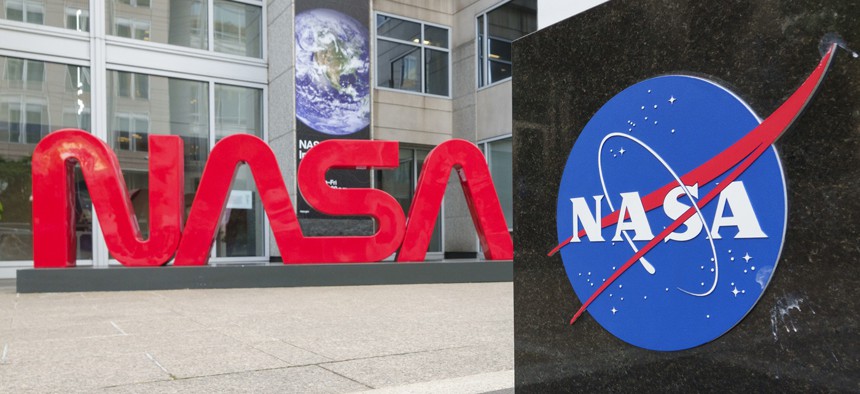
Kevin Carter/Getty Images
US risks losing space dominance to China without NASA support, experts say
Continuing the space agency’s programs “is a matter of national security,” Sen. Ted Cruz, R-Texas, said during a congressional hearing.
China could reshape the global order if the U.S. relinquishes its leadership in space to Beijing, lawmakers and former officials said during a congressional panel on Wednesday.
Bipartisan members of the Senate Commerce, Science, and Transportation Committee agreed that funding and supporting NASA’s operations directly affects America’s diplomatic and domestic priorities, and they warned that the U.S. is at risk of being outcompeted.
Sen. Ted Cruz, R-Texas, the panel’s chairman, called space “a strategic frontier with direct consequences for national security, economic growth and technological leadership.”
“That is why continuity in NASA's programs is not simply good practice; it is a matter of national security,” Cruz said. “Any drastic changes in NASA's architecture at this stage threaten United States leadership in space. Delays or disruptions only serve our competitors' interests.”
President Donald Trump’s “One Big, Beautiful Bill,” which was signed into law in July, included billions of dollars for NASA’s Artemis effort to resume crewed lunar missions. But lawmakers also argued that sustained funding for NASA is needed to outpace China and ensure the future of its missions.
Sen. Maria Cantwell, D-Wash., the committee’s ranking member, noted that the hearing was being held during a summit between Chinese President Xi Jinping, Russian President Vladimir Putin, and North Korean leader Kim Jong Un, which she said was likely to include discussions about space and defense.
Given Chinese competition and strengthening ties between regional superpowers, Cantwell said, “The only thing we have to do is make sure we in Congress get the budget right and support the Artemis missions.”
Cruz reiterated his support for the Artemis program. “it would be folly to cut short these missions after much of the hardware has already been purchased and, in some cases, delivered and with no commercial alternative readily available,” he said, adding that he plans to work “hand-in-hand with the administration to ensure that those funds are utilized in full accordance with congressional intent.”
China, which has announced plans to conduct a manned mission to the moon by 2030, already operates its own low-Earth orbit space station.
When asked what would happen if China beat the U.S. back to the moon, Michael Gold — president of civil and international space for Redwire and a former associate administrator for space policy at NASA — said, “If they get there first, we will see a global realignment that will impact our economy, our tax base, our ability to innovate and our national security in terms of diplomacy and geopolitics that will affect security and many other aspects of our daily lives.”
Gold was instrumental in the development of the Artemis Accords while with the U.S. space agency. The accords were established in 2020 to develop a common set of principles around space exploration. There are currently 56 signatories to the agreement; China is not among them.
“At the end of the day, what we have to have is rules,” said Jim Bridenstine, managing partner of the Artemis Group and the NASA administrator during the first Trump administration.
He added, “It is highly unlikely that we will land on the moon before China,” citing concerns about NASA’s selection of key equipment for the Artemis mission.
Bridenstine also said funding constraints and potential cuts to NASA’s operations pose a considerable challenge, particularly given Congress’ recent appropriations difficulties. Lawmakers must fund the government by Sept. 30 or risk forcing a shutdown.
“I want to be clear: We need to be advocating for appropriations because, ultimately, technology is changing, capabilities are changing and we need to be able to change programs commensurate with the times and not just fund things the way they used to be, because then we buy obsolete things and we don't buy the right things,” he said, warning about the use of shorter-term continuing resolutions to avoid government shutdowns.
He also voiced his support for NASA’s Science Mission Directorate, which would see a roughly 50% cut under the White House’s proposed fiscal year 2026 budget for the space agency.
“We need the ability to look out in space and see large objects that could really hit Earth and do it damage,” he said. “And not only that, but we need to be able to intercept those, if necessary. And that's what our space program is capable of doing. It's an element of the Science Mission Directorate inside NASA, and it needs to be funded.”
Sen. Jerry Moran, R-Kan., however, said during the hearing that he intends to vote against a continuing resolution, “which would mean a shutdown.”
“As long as it's easier to do a CR than it is to do appropriation bills, we apparently are not going to do them,” he said. “And it is a mistake for this Congress to get in the habit of continuing resolutions. And unless there's a consequence, we're going to do them every year.”

